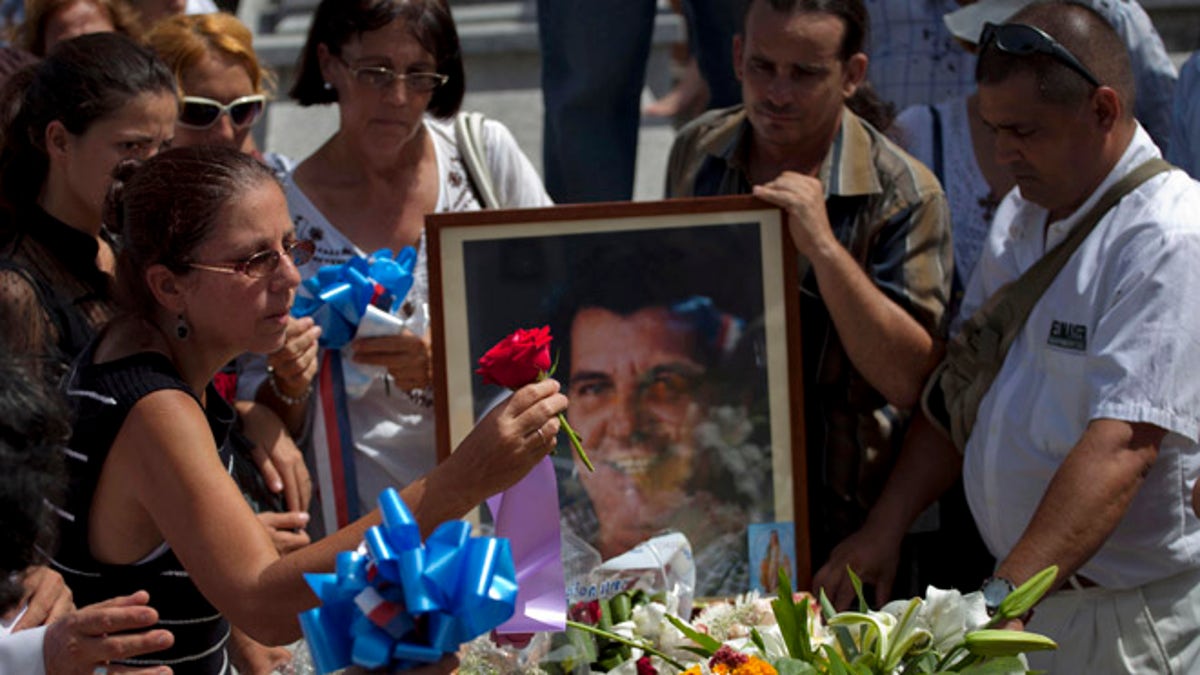
Ofelia Acevedo, viuda del difunto activista cubano Oswaldo Payá, coloca una flor sobre el ataúd durante el entierro en La Habana, martes 24 de julio de 2012. Payá, de 60 años, ganó fama internacional como promotor del Proyecto Varela, una campaña de firmas hace 10 años para pedir a las autoridades las libertades de expresión y reunión, entre otras. Fue considerada la iniciativa no violenta más grande para lograr cambios en el sistema cubano. Payá murió el 22 de julio de 2012 en un accidente automovilÃstico. (AP Foto/Ramón Espinosa) (AP)
What kind of regime could be suspected of engineering a car accident to kill an opponent? The kind that made a “criminal” out of a man like Oswaldo Payá.
This weekend, the widow of Cuban dissident Oswaldo Payá rejected the Castro regime’s assertion that the July 22nd automobile crash that claimed her husband’s life was the result of reckless driving.
After hearing of Payá’s untimely death, his family members explained that he received persistent threats during two decades of political opposition.
Their suspicions were raised in the week after the incident because Cuban authorities had detained two European pro-democracy activists who were in the car during the crash that killed Paya and a Cuban colleague, Harold Cepero Escalante.
On Monday, in a session with reporters organized by the internal security agency, the Spanish citizen who was driving the car took responsibility for the accident; he faces charges in Cuba’s Orwellian justice system. His Swedish colleague issued an obligatory confession for supporting Payá’s “illicit” activities.
The two men looked more like hostages than witnesses, and both pleaded with the international community to get them out of Cuba.
I had the privilege of meeting Oswaldo Payá, a soft-spoken, courageous man of faith, during a rare visit to Washington, DC. A devout Roman Catholic, he reminded me of the many church laymen I met during my earlier visit to Cuba. Like them, he seemed liberated by his faith – exuding a self-confidence and decency that the regime considers dangerous.
Payá was the tireless advocate of the “Varela Project” – a remarkable initiative that invoked Article 88 of Castro’s Soviet-era constitution to require the Cuba national assembly to debate a host of political freedoms. Of course, the Castro regime regarded Payá’s activism as a challenge to its legitimacy. It is less well-known that some anti-communist foes criticized the petition drive precisely because they thought it might legitimize the government and its constitution.
The Varela Project drew new energy and inspiration from Pope John Paul II’s 1998 pilgrimage to Cuba. For years, Payá and his network of supporters worked to gather more than the requisite 10,000 signatures and, in 2002, he presented the petition to authorities.
The regime rejected the Varela petition and, instead, amended the constitution to reaffirm Cuba’s “socialist” system. It also launched one of its infamous crackdowns on dissidents, with dozens of Varela activists, other dissidents, human rights activists and independent journalists arrested, tried and sentenced to dozens of years in prison. Payá was never imprisoned, perhaps because he earned international prominence – and the Sakharov Prize for Freedom of Thought in 2002 – for his peaceful activism.
In the long four years since Raul Castro took over for his older brother, his ruthlessness has suffocated any wishful thinking about a Cuban glasnost. He has preserved the police state apparatus that treats 11 million Cubans as traitorous criminals. More than twice as many opposition figures were detained per month in 2011 as in the year before. Keeping up a brutal pace, several dozen of mourners at Paya’s funeral were detained by Cuban security agents. And, the regime has imprisoned American democracy worker Alan Gross since 2009 on trumped-up espionage charges.
So what does Raul Castro have to say in the wake of the untimely death of Oswaldo Payá? This weekend he offered a dialogue with the United States – “a conversation between equals.” Setting aside the staggering delusion that Castro considers his regime equal to any decent democracy, such a dialogue must be among the Cuban people about the future they deserve.
Payá knew this.
Until that process is begun in earnest, the United States should reverse recent unilateral concessions and reserve robust economic and political relations for a government in Havana that is accountable to its people.
Was Payá a victim of a ham-handed plan to silence him?
Even if he was, the thugs of the regime must know that there is no hope of quelling the wellspring of decency that Payá, his movement and his faith represented. The fact that they know that is Payá’s remarkable legacy.








































